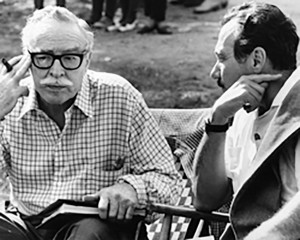Edward Lewis, producer of “Spartacus,” and the Spanish Civil War

Edward Lewis, right, and the screenwriter Dalton Trumbo in 1967. Mr. Lewis hired Trumbo, a victim of the Hollywood blacklist, to secretly write “Spartacus” and then demanded that he get credit. Via Lewis family
Edward Lewis, best known as the producer of Stanley Kubrik’s Spartacus (1960), passed away this week; he was 99. His life and work had several important connections to the Spanish Civil War.
For Spartacus, Lewis hired screenwriter Dalton Trumbo who, along with Lincoln vet Alvah Bessie, was one of the “Hollywood Ten.” When Lewis demanded that Trumbo be credited publicly for his work on the film, in effect he ended the blacklist.
Spartacus, which featured Kirk Douglas, Jean Simmons, and Tony Curtis, was based on a bestselling novel by Howard Fast, who, along with Lincoln vet Dr. Ed Barsky, was jailed when the Joint Antifascist Refugee Committee refused to hand its administration over to Congress (see here for a longer article on Barsky and the JAFRC).
Finally, Lewis’s brother in law was Lincoln vet Max Gerchik (1911-2008). Here is the biography we have of Gerchik in ALBA’s Volunteer Database:
Born in Brooklyn, New York, on January 16, 1911, he was the oldest of three children born to Russian immigrants Sophie and Harry Gerchik. Gerchik graduated with honors from New York University and began his medical studies at the University of Bonn, Germany. With the rise of Nazism, he transferred to the University of Berne, Switzerland.
In 1936, the Spanish Civil War broke out and he temporarily dropped out of medical school to join the anti-fascist forces of the Spanish Republic on the Zaragoza Front in their struggle against Franco and Fascism. Gerchik later returned to medical school in Switzerland and completed his degree. Soon thereafter, he returned home to the United States where his commitment to social justice issues and involvement in liberal political activities continued until the final days of his life.
The Gerchik family moved to Los Angeles soon after the United States joined the Second World War and Gerchik was assigned to the Pacific Fleet as a ship’s doctor. A burst appendix, however, later forced him to return to shore. Subsequently, he became resident physician for McDonald-Douglas, which was involved in the war effort. Gerchik later joined a medical practice located in Vernon which specialized in industrial medicine and centered around the provision of medical services to factory employees. Eventually, he bought that clinic and two others.
Gerchik loved his adopted city, especially after his adored Dodgers moved to Los Angeles just six months after he relocated to Los Angeles. He married his first wife, Marjorie, in 1950, and adopted her daughter, Ann, as his own. He and Marge later had two children of their own, Dan and Lisa. He met and married his second wife, Reca, in 1967, and they had one child, their daughter, Julie. Gerchik’s primary focus was always his family; that was what mattered most to him in the world. After his family, however, Gerchik’s greatest passions were the Dodgers and politics, followed closely by his love of classical music and fine art. He had a deep knowledge and appreciation of both. In fact, one of the reasons he chose to leave Brooklyn and attend medical school in Germany was because that was the birthplace of his two favorite composers, Beethoven and Bach.
Max Gerchik, M.D., passed away on September 21, 2008 at the age of 97 at his home in Pacific Palisades.
– Biography courtesy of Julie Gerchik.













